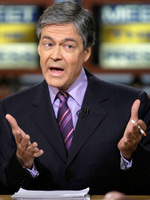 Live blogging today’s Midmorning, featuring John Harwood: co-author with Gerald Seib, “Pennsylvania Avenue: Profiles in Backroom Power.” Harwood is the chief political correspondent for CNBC. He also writes The Caucus column for The New York Times.
Live blogging today’s Midmorning, featuring John Harwood: co-author with Gerald Seib, “Pennsylvania Avenue: Profiles in Backroom Power.” Harwood is the chief political correspondent for CNBC. He also writes The Caucus column for The New York Times.
9:08 – Harwood said he was with Tim Russert on Friday morning. Russert, of course, died Friday afternoon. “I don’t think Tim was feeling all that well,” he quoted his co-author, Gerald Seib, as saying. Harwood was to be on Meet the Press yesterday. Jim Fallows, by the way, had an interesting blog post on the subject, too.
9:13 – “What’s the thing you’re most curious about in Obama-McCain?” Kerri Miller asked
To what extent Obama tries to surf the Democratic wave, Harwood says. “All the signs are positive for Democrats that they’ll expand their majority. Does Obama simply try to ride that wave or … is he going to try to reach across the aisle and create a different kind of politics and work with Republicans?”
Here’s some recommended reading: Why a McCain Win May Be Bad for GOP, Good for Democrats
Each candidate has to win over internal skeptics. There’s a reason conservatives gravitate to the GOP and liberals to Democrat Party. The ideological divide is the core of the campaign, but how the candidates change “around the edges” — look for new constituencies and states — is what will define the campaign.
9:19 – McCain is trying to hang tax-and-spend around Obama’s neck. Harwood interviewed Obama last week and asked if it’s wise to go ahead with tax cuts. “I’m not going to be an idealogue, if I talk to my advisors and they say this will hurt the economy, I’m not going to go ahead with them,” Obama said. This, Harwood says, is the flexibility that makes Obama a “different candidate and Republicans don’t hate him so much.”
True?
9:22 – The Catholic vote. Clinton dominated the Catholic vote. “Some of the analysis that he (Obama) is losing the Catholic vote, the blue-collar vote… it’s going to be easier for Democrats to remember they are, in fact, Democrats. Those who are independent — those are big targets and Obama will have to work to win those — the soft Republican Catholics, you might say — over.
9:24 – Discussing an NPR story on McCain’s voting record.
McCain’s Senate record generally shows strong support for President Bush’s agenda, although he opposed both big Bush tax cuts. As a presidential candidate, McCain has gone from breaking ranks with the president on taxes, to falling in line.
9:25 – McCain faces a challenge. He’s got a declining Republican “brand,” and a base that doesn’t trust him. How does he win that base, and then expand it to the center?
9:31 Where did Barack Obama first indicate his intention to run for president? Meet the Press. The anti-kingmaker evidence: So did Ralph Nader.
9:32 If Obama is elected, a “real drama’ will be how will he navigate the power avenues in Washington while keeping reformers happy.
9:39 – Caller asks why sexism and racism wasn’t dealt with the media? “It’ll be an issue if she (Clinton) ever runs again.”
9:41 – I find myself wondering where the Harwood’s snapshot of what’s going on in the backrooms is. What’s going on behind the scenes, John? Most of the anecdotes so far are things that happened out in the open.
9:44 Caller: Media should help lead us to the search for the truth rather than a desire for advocacy. “American journalism is increasingly adversarial and journalism of advocacy which historically is editorial work, not reporting.”
Over to you, John.
“Those points are right on,” he said. “It is correct that historically we had an advocacy press for a lot of our country’s history. We saw increasing professionalization of the press after WWII. After WWII, you had a much more sense of the common space of a national conversation — three TV networks, millions of Americans that shared a common experience. Over time, the parties sorted themselves out, the media sorted themselves out, and with the rise of cable TV and the Internet, that analysis has taken on partisan colorization, so the common space is lost; the civil space is lost and what you see is supercharged conversations among partisans but not across the citizenry.
9:50 – Kerri relays trouble getting Sen. Jim Webb booked for her show. Is that because he’s on the short list for vice president?
Harwood: “Yes.”
Webb, Harwood says, is an example of the “new” Democrat, candidates who can talk to blue-collar voters, and talk to gun owners.
9:54 p.m. — Miller: Who’s the best press secretary? Harwood gives Marlin Fitzwater — Reagan and Bush — props. Says he knew how to help reporters without hurting his own boss.
9:56 p.m. – Will McCain pick Pawlenty as VP? “I’m not going to predict that but he would be in a group of possibilities. Not terribly insightful, there.
